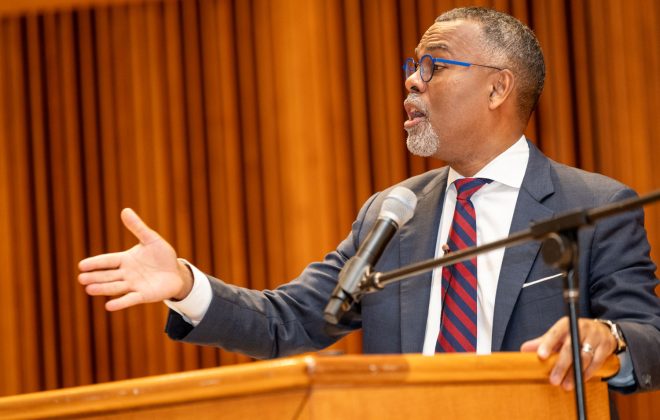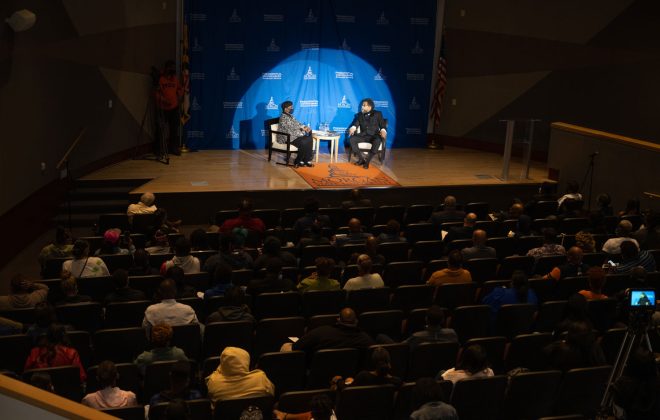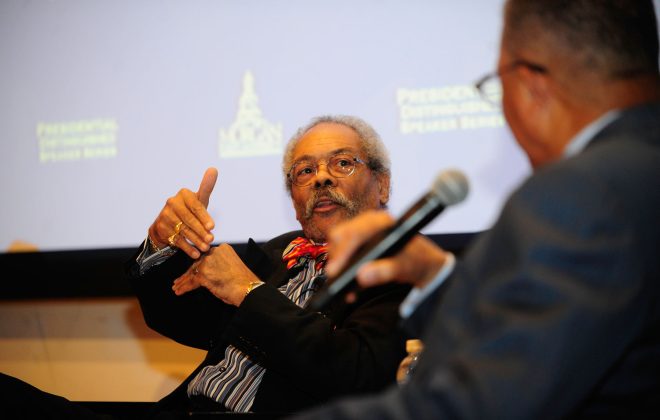How Morgan’s Presidential Distinguished Speaker Series Amplifies Ideas, Expands Minds and Builds Legacy
By design and by purpose, universities have become places where minds stretch, perspectives shift and ideas collide to shape a better future. At Morgan State University, this ethos takes center stage through a signature initiative that has, since 2016, drawn some of the nation’s most compelling voices to campus: the Presidential Distinguished Speaker Series (PDSS).
Born of Morgan President David K. Wilson’s commitment to producing not just graduates but leaders and critical thinkers, PDSS is more than a lecture series. It is a living expression of Morgan’s mission to foster dialogue, intellectual rigor and exposure to diverse worldviews.
“We want to make sure that when students leave this institution, they have been exposed to points of view that really require them to think deeply about an issue,” President Wilson explains. “This is not about grabbing a bullhorn and shouting someone down. It’s about developing the intellectual tools to offer a rational, sensible and fact-based counterargument.”
These speakers come from an array of backgrounds and represent a wide spectrum of perspectives and knowledge. And our students are better equipped for the world because of their exposure to them.
— Morgan President David K. Wilson
A Stage for Ideas, A Classroom Without Walls
On an unusually warm but breezy April night, an important conversation was taking place in the University Student Center on Morgan’s campus. While many outside its doors found solace in the euphoria of the “I Love Morgan Week” celebration underway, those seated within the confines of the theater were transfixed by a sobering discussion. It was just the latest installment of Morgan’s Presidential Distinguished Speakers Series, featuring Richard V. Reeves, founding president of the American Institute for Boys and Men, and MK Asante, a professor of creative writing and film at Morgan. Their joint talk covered the topics of “The Silent Crisis of America’s Boys and Men” and “Male College Retention: Experiences and Lessons Learned.”
 Whereas Asante drew heavily from personal narrative, Reeves shared some alarming statistics about disproportionately high and rising suicide rates among young men, and precipitously declining rates of college enrollment in the U.S. among men in general and Black men in particular.
Whereas Asante drew heavily from personal narrative, Reeves shared some alarming statistics about disproportionately high and rising suicide rates among young men, and precipitously declining rates of college enrollment in the U.S. among men in general and Black men in particular.
Since its inception, PDSS has hosted 22 distinguished guests — from U.S. attorneys general and civil rights leaders to tech executives, cultural critics and global changemakers. Speakers like Loretta Lynch, Cornel West, Ana Navarro, Charles Blow, Stedman Graham and Thomas L. Friedman have brought their lived experiences and expertise to Morgan’s campus, the National Treasure, to discuss everything from politics and policing to leadership, technology and race.
These events aren’t passive affairs. Audience participation is built in, encouraging students to ask questions, challenge ideas and find their voice. Held on campus, the series ensures accessibility for the Morgan community and roots each lecture in the University’s academic ecosystem.
“These speakers come from an array of backgrounds and represent a wide spectrum of perspectives and knowledge,” Wilson says. “And our students are better equipped for the world because of their exposure to them.”
That night of the April PDSS, Reeves’ and Asante’s message resonated with Morgan students such as Jeremiah Green, a sophomore Civil Engineering major. Green said he was particularly impressed with Asante’s own story of using creative writing as a form of expression, one that helped shift his previously negative mindset toward education in his teen years.
“School was very boring to me, because I was always a smart kid, and I feel like, in a way, it kind of almost limited me in a weird way,” Green explained. “I just went to class, did what I was told, turned in my homework. And I was never really thinking about my future. I was never really thinking about expressing myself.”
Green says he was also struck by what Reeves described as the post-COVID mental health crisis among young men, and by a statistic Reeves presented that the suicide rate for men is four times that for women.
“I know I’ve definitely had friends…I could have done a better job (of) checking up on,” Green said. “I didn’t realize how bad someone’s situation could be.”


An Intellectual Legacy Reimagined
Although the Presidential Distinguished Speaker Series is a recent fixture, its spirit is anchored in Morgan’s historic role as a hub for transformative voices. The University has long served as a venue where thought leaders engage directly with students and the broader community.
Ida E. Jones, Ph.D., Morgan’s associate director of Special Collections and University Archivist, offers important historical context.
“Morgan has always been a site for national conversations,” she says. “When Malcolm X debated Morgan professor August Meier in 1962, or when Nikki Giovanni electrified Murphy Auditorium in 1977, those weren’t just moments. They were mile markers in the cultural and intellectual journey of this institution.”
From the mid-1960s through the early 1970s, Morgan’s Philosophy Department (now the Department of Philosophy and Religious Studies) held a series of lectures and conferences that brought a plethora of prominent speakers to campus: civil rights activists Bayard Rustin, James Farmer and Harris Wofford in 1971 and poet Amiri Baraka and psychiatrist Alvin Poussaint in 1972, to name a few.
The legacy of important voices finding their way to Maryland’s largest Historically Black College or University is rich. PDSS expands that legacy, ensuring Morgan remains not only a destination for higher education but a conduit for higher discourse.
What makes the PDSS roster especially compelling is its diversity — not just in identity but in discipline and ideology. Politicos like U.S. Rep. Cedric Richmond, the Rev. Al Sharpton and Melissa Harris-Perry, Ph.D.; tech leaders like Maxine Williams (of Meta) and Yolanda Mangolini (of Google); and authors like Heather McGhee and Eddie Glaude Jr., Ph.D., have shared their distinct visions with Morgan audiences.
Each speaker’s appearance is carefully curated to align with timely issues and to reflect Morgan’s commitment to civic engagement, innovation and the Black intellectual tradition.
In its inaugural year of 2016, the series kicked off with a talk focused on the “Big Trends Shaping the World,” given by Pulitzer Prize-winning columnist Thomas L. Friedman, famed author of “The World Is Flat.” It was the first of five PDSS events held that year. In 2019, before the COVID-19 pandemic shut down in-person events and confined us to our homes, Morgan hosted four PDSS events on campus, the second most in a given year. The standout attraction was civil rights leader the Rev. Al Sharpton’s address on “Civil Rights in the Age of Trump.”
“These aren’t lectures to fill seats,” President Wilson emphasizes. “They’re carefully chosen engagements designed to challenge, inform and uplift.”
Morgan has always opened its doors to voices that move the culture and provoke the conscience. PDSS is just the latest chapter in a very proud story.
— Dr. Ida E. Jones,
Associate Director of Special Collections and University Archivist, Morgan State University
Impact Beyond the Auditorium
As is true of the many speaker series presented by colleges and universities around the globe, the effect of Morgan’s Presidential Distinguished Speaker Series ripples beyond the lecture hall. Topics raised during PDSS talks are incorporated by faculty into classroom discussions. Student journalists cover the events. Campus conversations take on new dimensions. For many students, these events mark the first time they’ve been in the room with figures who shape national policy or influence public thought.
And it’s not only students who benefit. PDSS also serves the greater Baltimore community, drawing alumni, neighbors and leaders into Morgan’s intellectual orbit. In this way, PDSS fulfills another goal: strengthening Morgan’s role as a civic anchor and idea incubator for the region.
In an era defined by ideological division and digital echo chambers, creating space for open, thoughtful, in-person dialogue has never been more critical. At Morgan, PDSS stands as a bulwark against the erosion of civil discourse.
“What I want,” Wilson says, “is for our students to be able to stand tall and defend whatever position they take — with clarity, with courage and with intellectual depth.”
This is the mission of the Presidential Distinguished Speaker Series — not simply to educate but to empower.
Now in its ninth year, PDSS continues to evolve. New voices, new issues and new audiences await. But at its core, the series remains rooted in a simple but profound truth: that education is not just about absorbing knowledge. It’s about engaging with it, interrogating it and, when necessary, transforming it.
As Dr. Jones puts it, “Morgan has always opened its doors to voices that move the culture and provoke the conscience. PDSS is just the latest chapter in a very proud story.”
Past PDSS Speakers at a Glance
- Thomas L. Friedman – Global trends & geopolitics
- Melissa Harris-Perry – Race, gender & politics
- Loretta Lynch – Criminal justice reform
- Cornel West – Black intellectual responsibility
- Heather McGhee – The economic cost of racism
- Stedman Graham – Leadership & self-identity
- Khalil Muhammad – State of African Americans & politics
…and many more


















